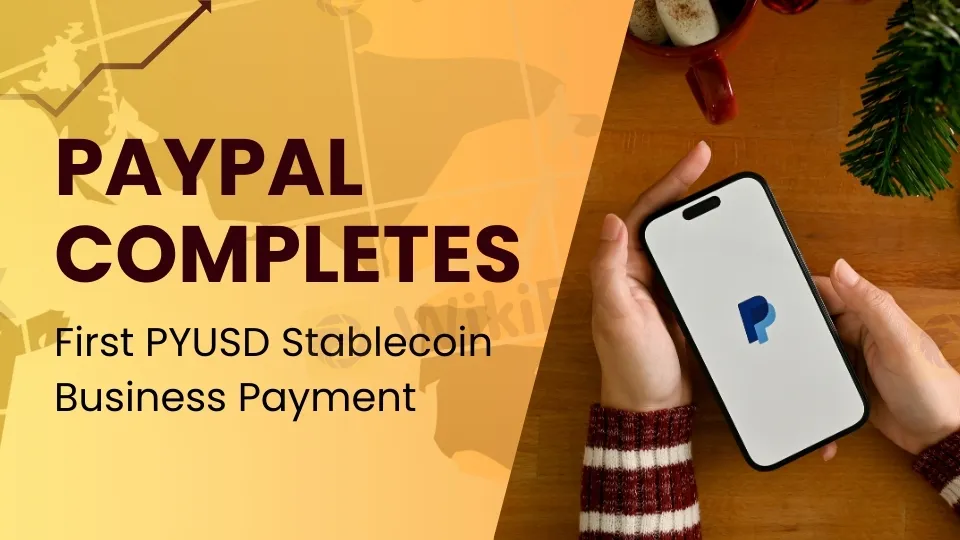简体中文
繁體中文
English
Pусский
日本語
ภาษาไทย
Tiếng Việt
Bahasa Indonesia
Español
हिन्दी
Filippiiniläinen
Français
Deutsch
Português
Türkçe
한국어
العربية
PayPal Completes First PYUSD Stablecoin Business Payment
Abstract:PayPal completes its first PYUSD business payment, showcasing the future of stablecoin adoption in global business transactions and cross-border payments.

Last September 23, payments giant PayPal conducted its first commercial transaction using PYUSD, the company's stablecoin. This is an important milestone in the changing realm of commercial payments, illustrating the increasing use of stablecoins in cross-border transfers.
Stablecoin Payments Reshape Business Transactions
PayPal's PYUSD, which debuted last year and is tied to the US dollar, was utilized to settle an invoice with Ernst & Young LLP. The transaction was completed using SAP SE's digital currency hub, which provides rapid, 24-hour payment processing. While the precise billing amount is unknown, PYUSD's market value at the time was $700 million.
The Rise of Stablecoins in Global Business
According to Jose Fernandez da Ponte, Senior Vice President of Blockchain and Digital Currency at PayPal, stablecoins such as PYUSD are an excellent choice for commercial payments. The use of blockchain for these transactions removes the need for middlemen, which speeds up settlement times and lowers risks.
With companies worldwide shifting toward stablecoin usage, especially for cross-border payments, the advantages of adopting PYUSD for business-to-business (B2B) transactions have become clear. This tendency is particularly noticeable in places with extremely fluctuating currencies, where stablecoins are used to allow speedier and more trustworthy transactions.

Business Payments with Cryptocurrency Gain Traction
Another example of stablecoin usage came earlier this year when the BVNK platform allowed firms to convert US dollars into stablecoins for SWIFT payments. These developments demonstrate the corporate world's migration towards cryptocurrencies and blockchain technology.
PayPal is extending its cryptocurrency offerings by enabling merchants to purchase, store, and trade digital currencies straight from their business accounts. This strategic initiative aligns PayPal with the future of digital payments.
PayPal's Strong Financial Performance Amidst Innovation
Along with its accomplishments in blockchain payments, PayPal announced a great financial performance in the third quarter. Revenue was $9.08 billion, a 12% rise from the same time previous year. Active accounts also increased to 500 million, generating a total payment volume (TPV) of $355 billion, a 10% increase year on year.
Operating costs, which included expenditures in R&D, reached $6.56 billion. Despite this, the company's third-quarter net income was $1.64 billion, with an 18% margin. Earnings per share (EPS) increased to $1.25, while gross profit for the quarter was $2.52 billion, resulting in a 27.8% margin.
A Future Driven by Blockchain and Stablecoins
PayPal's use of PYUSD and blockchain technology positions the corporation at the forefront of digital finance innovation as more companies across the globe investigate cryptocurrency-based payment options. With stablecoin solutions becoming more appealing to CFOs and other company leaders, PayPal's continuing drive for blockchain integration confirms its position in redefining the future of commercial payments.
Stay ahead in the world of digital finance! Read more about PayPal's groundbreaking PYUSD stablecoin transaction and how it's reshaping business payments on WikiFX News. Don't miss out on the latest updates in blockchain and cryptocurrency.

Disclaimer:
The views in this article only represent the author's personal views, and do not constitute investment advice on this platform. This platform does not guarantee the accuracy, completeness and timeliness of the information in the article, and will not be liable for any loss caused by the use of or reliance on the information in the article.
Read more

Coinbase Under Scrutiny Amid Wrapped Bitcoin Delisting Controversy
Coinbase has come under fire after announcing its decision to delist Wrapped Bitcoin (wBTC), a move critics claim could be driven by competitive interests. The delisting, set to take effect on 19 December, has sparked allegations of market manipulation and concerns about fairness in the cryptocurrency ecosystem.

Solana Soars to All-Time High, Hits $264 on Coinbase
Solana hits $264 on Coinbase, breaking its 3-year high with an 11% daily surge. Learn what’s driving SOL's meteoric rise and the crypto market rally.

FCA Identifies Clone Firm Exploiting Admiral Markets' Credibility
The UK Financial Conduct Authority (FCA) has issued a public warning regarding a fraudulent entity impersonating Admiral Markets, a legitimate and authorised trading firm. The clone firm, operating under the name Admiral EU Brokers and the domain Admiraleubrokerz.com, has been falsely presenting itself as an FCA-authorised business.

Malaysian Man Loses RM113,000 in Foreign Currency Investment Scam
A 57-year-old Malaysian man recently fell victim to a fraudulent foreign currency investment scheme, losing RM113,000 in the process. The case was reported to the Commercial Crime Investigation Division in Batu Pahat, which is now investigating the incident.
WikiFX Broker
Latest News
Webull Partners with Coinbase to Offer Crypto Futures
eToro Expands Nationwide Access with New York Launch
Why Is UK Inflation Rising Again Despite Recent Lows?
Hackers Charged for $11M Crypto Theft Using SIM-Swaps
Role of Central Banks in the FX Market
FCA Alerts Against Sydney FX
What Makes Cross-Border Payments Easier Than Ever?
Trader Exposes Unethical Practices by STP Trading
Interactive Brokers Launches Tax-Friendly PEA Accounts in France
Google Warns of New Deepfake Scams and Crypto Fraud
Currency Calculator


